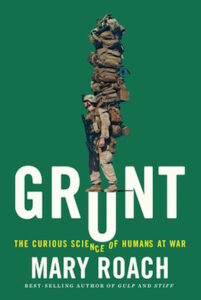 Mary Roach has a new book in print.
Mary Roach has a new book in print.
That’s it – that’s all I should have to write for you to be sufficiently motivated to seek out a copy.
Ever since I read her brilliant book Stiff; the Curious Lives of Human Cadavers (on a trans-U.S. airplane flight, no less – talk about making one’s fellow seat mates uncomfortable!) I have delighted in her ability to take a range of topics that most people would think to be somewhere between uncomfortable (Gulp) and unmentionable (Bonk), and turn them into lively, eye-opening books.
But I’ll admit, with the present state of the world being the violent mess that it is, I wasn’t sure if I’d be as keen to read her new book Grunt; the Curious Science of Humans at War as I was to read all her previous ones. I just didn’t think I wanted to know more about the technology of destruction than a decade of work in the firearms industry had already taught me.
Fortunately, I happened to tune in to NPR’s Fresh Air on 31 May, where I heard Ms. Roach being interviewed by Terry Gross about medical maggots, diarrhea, olfactory-based “weapons” (that’s right, stink bombs) and a number of other decidedly off-beat – and often biological rather than technological – realities of warfare that don’t often get taken up in the normal reporting about the subject. True to form, it appears that once again Ms. Roach has managed to bring to light a range of topics we might not commonly think about when we hear the word “war.”
Should a copy of Grunt find its way to my book-laden desk, I’ll be sure to move it directly to a place near the summit of Mount To-be-read.
If you enjoyed reading this, please consider signing up for The Well-read Naturalist's newsletter. You'll receive a helpful list of recently published reviews, short essays, and notes about books in your e-mail inbox once each fortnight.
